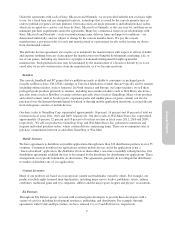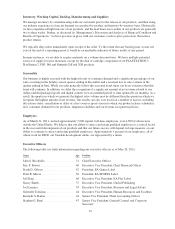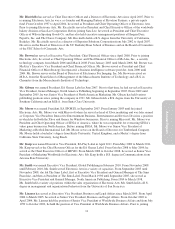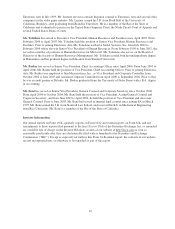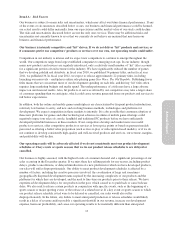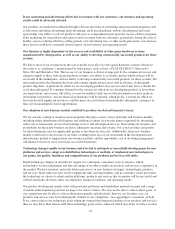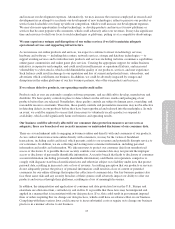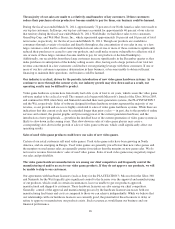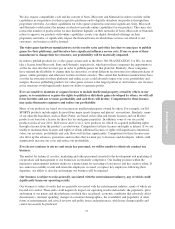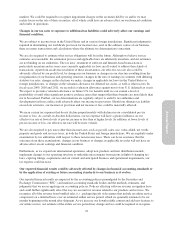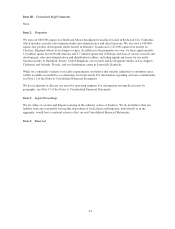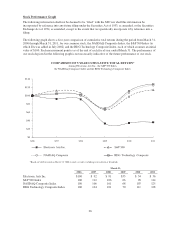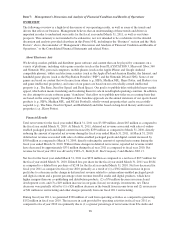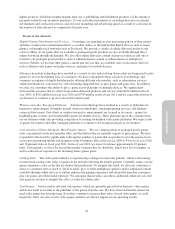Electronic Arts 2011 Annual Report Download - page 95
Download and view the complete annual report
Please find page 95 of the 2011 Electronic Arts annual report below. You can navigate through the pages in the report by either clicking on the pages listed below, or by using the keyword search tool below to find specific information within the annual report.
Annual Report
regulating or mandating ratings requirements on entertainment software content and certain foreign countries
already allow government censorship of entertainment software products. Adoption of government ratings
system or restrictions on distribution of entertainment software based on content could harm our business by
limiting the products we are able to offer to our customers and compliance with new and possibly inconsistent
regulations for different territories could be costly or delay the release of our products.
As we increase the online delivery of our products and services, we are subject to a number of foreign and domestic
laws and regulations that affect companies conducting business on the Internet. In addition, laws and regulations
relating to user privacy, data collection and retention, content, advertising and information security have been
adopted or are being considered for adoption by many countries throughout the world. The costs of compliance with
these laws may increase in the future as a result of changes in interpretation. Furthermore, any failure on our part to
comply with these laws or the application of these laws in an unanticipated manner may harm our business.
Our products are subject to the threat of piracy and unauthorized copying.
We take measures to protect our pre-release software and other confidential information from unauthorized
access. A security breach that results in the disclosure of pre-release software or other confidential assets could
lead or contribute to piracy of our games or otherwise compromise our product plans.
Further, entertainment software piracy is a persistent problem in our industry. The growth in peer-to-peer
networks and other channels to download pirated copies of our products, the increasing availability of broadband
access to the Internet and the proliferation of technology designed to circumvent the protection measures used
with our products all have contributed to an expansion in piracy. Though we take technical steps to make the
unauthorized copying of our products more difficult, as do the manufacturers of consoles on which our games are
played, these efforts may not be successful in controlling the piracy of our products.
While legal protections exist to combat piracy, preventing and curbing infringement through enforcement of our
intellectual property rights may be difficult, costly and time consuming, particularly in countries where laws are
less protective of intellectual property rights. Further, the scope of the legal protection of copyright and
prohibitions against the circumvention of technological protection measures to protect copyrighted works are
often under scrutiny by courts and governing bodies. The repeal or weakening of laws intended to combat piracy,
protect intellectual property and prohibit the circumvention of technological protection measures could make it
more difficult for us to adequately protect against piracy. These factors could have a negative effect on our
growth and profitability in the future.
If one or more of our titles were found to contain hidden, objectionable content, our business could suffer.
Throughout the history of our industry, many video games have been designed to include certain hidden content
and gameplay features that are accessible through the use of in-game cheat codes or other technological means
that are intended to enhance the gameplay experience. However, in several cases, hidden content or features have
been found to be included in other publishers’ products by an employee who was not authorized to do so or by an
outside developer without the knowledge of the publisher. From time to time, some hidden content and features
have contained profanity, graphic violence and sexually explicit or otherwise objectionable material. In a few
cases, the Entertainment Software Ratings Board (“ESRB”) has reacted to discoveries of hidden content and
features by reviewing the rating that was originally assigned to the product, requiring the publisher to change the
game packaging and/or fining the publisher. Retailers have on occasion reacted to the discovery of such hidden
content by removing these games from their shelves, refusing to sell them, and demanding that their publishers
accept them as product returns. Likewise, consumers have reacted to the revelation of hidden content by refusing
to purchase such games, demanding refunds for games they have already purchased, and refraining from buying
other games published by the company whose game contained the objectionable material.
We have implemented preventative measures designed to reduce the possibility of hidden, objectionable content
from appearing in the video games we publish. Nonetheless, these preventative measures are subject to human
error, circumvention, overriding, and reasonable resource constraints. In addition, to the extent we acquire a
company without similar controls in place, the possibility of hidden, objectionable content appearing in video
games developed by that company but for which we are ultimately responsible could increase. If a video game
19


